England RQF HNC/HND Reflective Practice Report Analysis
VerifiedAdded on 2023/01/17
|10
|2860
|93
Report
AI Summary
This report delves into reflective practice within the context of healthcare, specifically at White Gables Care Home. It begins by defining reflective practice and elucidating its significance for health and social care practitioners, emphasizing its role in enhancing care quality and bridging the gap between theory and practice. The report then outlines the core practice themes that provide a framework for reflection and describes two prominent reflection models: the Gibbs reflective model and the Atkins and Murphy model, along with tools that support reflection. Furthermore, it reflects on the methods used to gather feedback on practice, assesses performance against practice themes and performance indicators, and evaluates the holistic professional learning and development. Finally, it concludes by outlining targets for professional career pathway development using a personal development plan (PDP). The report highlights the importance of continuous learning and self-assessment to improve patient care and advance professional growth in the healthcare field.
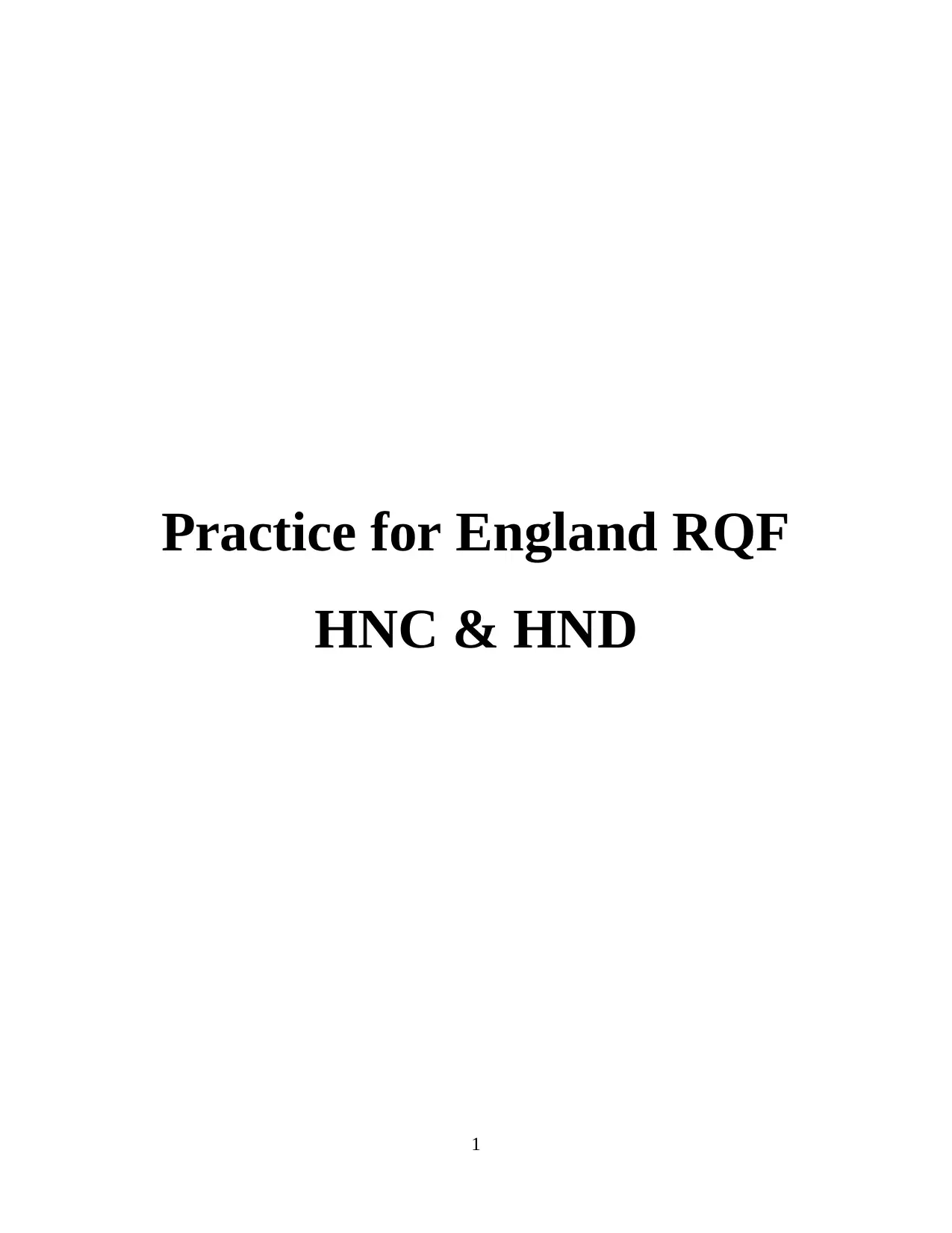
Practice for England RQF
HNC & HND
1
HNC & HND
1
Paraphrase This Document
Need a fresh take? Get an instant paraphrase of this document with our AI Paraphraser
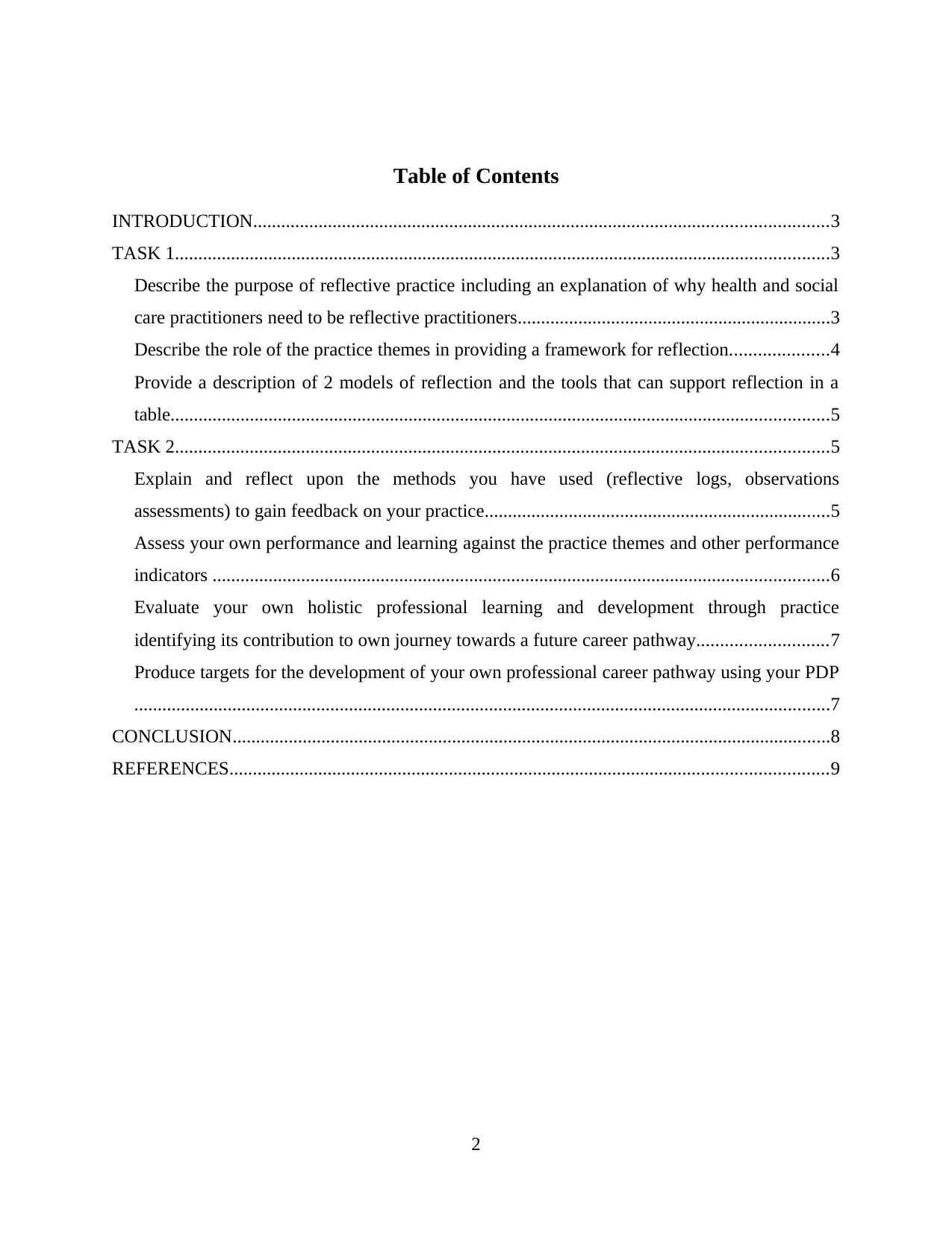
Table of Contents
INTRODUCTION...........................................................................................................................3
TASK 1............................................................................................................................................3
Describe the purpose of reflective practice including an explanation of why health and social
care practitioners need to be reflective practitioners...................................................................3
Describe the role of the practice themes in providing a framework for reflection.....................4
Provide a description of 2 models of reflection and the tools that can support reflection in a
table.............................................................................................................................................5
TASK 2............................................................................................................................................5
Explain and reflect upon the methods you have used (reflective logs, observations
assessments) to gain feedback on your practice..........................................................................5
Assess your own performance and learning against the practice themes and other performance
indicators ....................................................................................................................................6
Evaluate your own holistic professional learning and development through practice
identifying its contribution to own journey towards a future career pathway............................7
Produce targets for the development of your own professional career pathway using your PDP
.....................................................................................................................................................7
CONCLUSION................................................................................................................................8
REFERENCES................................................................................................................................9
2
INTRODUCTION...........................................................................................................................3
TASK 1............................................................................................................................................3
Describe the purpose of reflective practice including an explanation of why health and social
care practitioners need to be reflective practitioners...................................................................3
Describe the role of the practice themes in providing a framework for reflection.....................4
Provide a description of 2 models of reflection and the tools that can support reflection in a
table.............................................................................................................................................5
TASK 2............................................................................................................................................5
Explain and reflect upon the methods you have used (reflective logs, observations
assessments) to gain feedback on your practice..........................................................................5
Assess your own performance and learning against the practice themes and other performance
indicators ....................................................................................................................................6
Evaluate your own holistic professional learning and development through practice
identifying its contribution to own journey towards a future career pathway............................7
Produce targets for the development of your own professional career pathway using your PDP
.....................................................................................................................................................7
CONCLUSION................................................................................................................................8
REFERENCES................................................................................................................................9
2
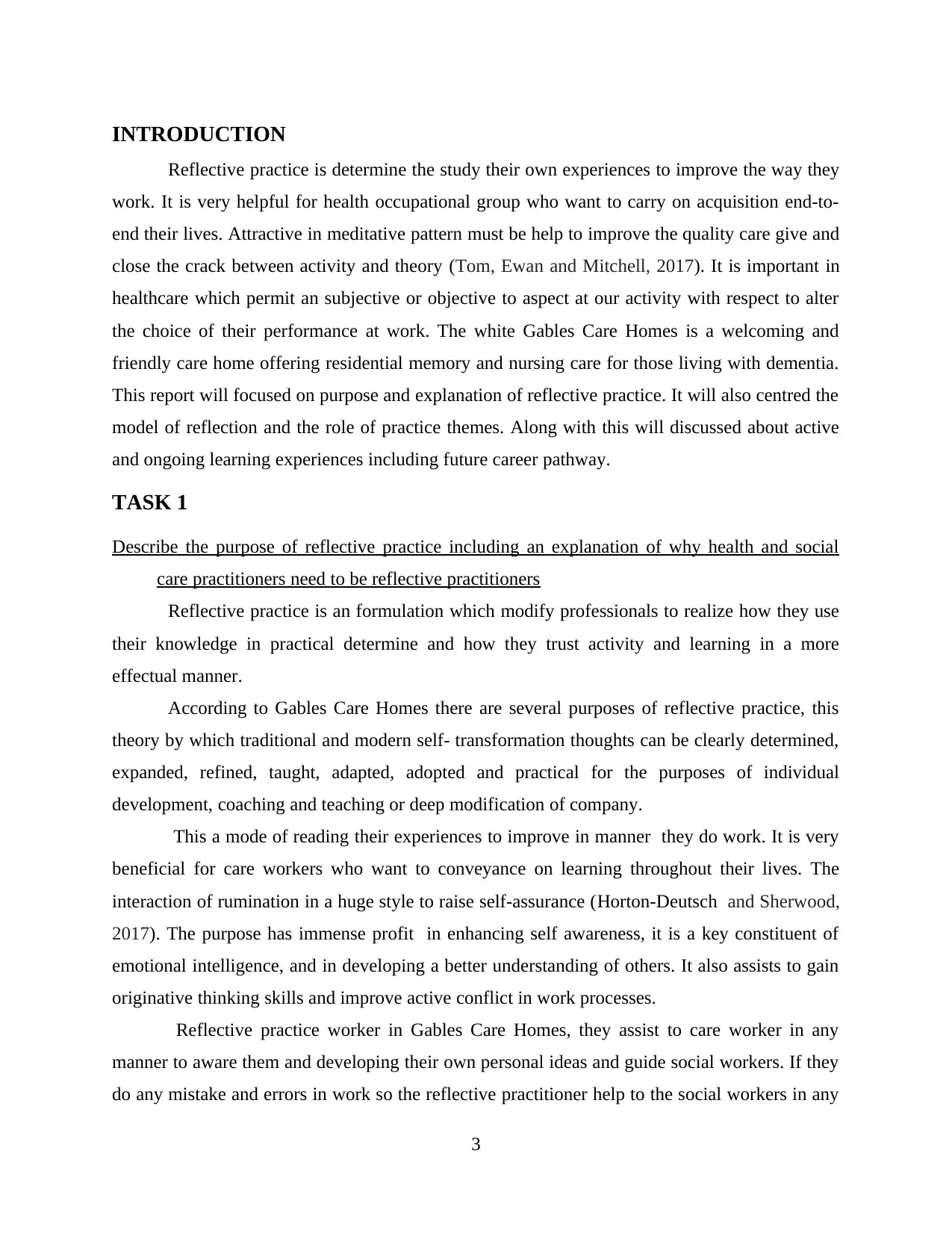
INTRODUCTION
Reflective practice is determine the study their own experiences to improve the way they
work. It is very helpful for health occupational group who want to carry on acquisition end-to-
end their lives. Attractive in meditative pattern must be help to improve the quality care give and
close the crack between activity and theory (Tom, Ewan and Mitchell, 2017). It is important in
healthcare which permit an subjective or objective to aspect at our activity with respect to alter
the choice of their performance at work. The white Gables Care Homes is a welcoming and
friendly care home offering residential memory and nursing care for those living with dementia.
This report will focused on purpose and explanation of reflective practice. It will also centred the
model of reflection and the role of practice themes. Along with this will discussed about active
and ongoing learning experiences including future career pathway.
TASK 1
Describe the purpose of reflective practice including an explanation of why health and social
care practitioners need to be reflective practitioners
Reflective practice is an formulation which modify professionals to realize how they use
their knowledge in practical determine and how they trust activity and learning in a more
effectual manner.
According to Gables Care Homes there are several purposes of reflective practice, this
theory by which traditional and modern self- transformation thoughts can be clearly determined,
expanded, refined, taught, adapted, adopted and practical for the purposes of individual
development, coaching and teaching or deep modification of company.
This a mode of reading their experiences to improve in manner they do work. It is very
beneficial for care workers who want to conveyance on learning throughout their lives. The
interaction of rumination in a huge style to raise self-assurance (Horton-Deutsch and Sherwood,
2017). The purpose has immense profit in enhancing self awareness, it is a key constituent of
emotional intelligence, and in developing a better understanding of others. It also assists to gain
originative thinking skills and improve active conflict in work processes.
Reflective practice worker in Gables Care Homes, they assist to care worker in any
manner to aware them and developing their own personal ideas and guide social workers. If they
do any mistake and errors in work so the reflective practitioner help to the social workers in any
3
Reflective practice is determine the study their own experiences to improve the way they
work. It is very helpful for health occupational group who want to carry on acquisition end-to-
end their lives. Attractive in meditative pattern must be help to improve the quality care give and
close the crack between activity and theory (Tom, Ewan and Mitchell, 2017). It is important in
healthcare which permit an subjective or objective to aspect at our activity with respect to alter
the choice of their performance at work. The white Gables Care Homes is a welcoming and
friendly care home offering residential memory and nursing care for those living with dementia.
This report will focused on purpose and explanation of reflective practice. It will also centred the
model of reflection and the role of practice themes. Along with this will discussed about active
and ongoing learning experiences including future career pathway.
TASK 1
Describe the purpose of reflective practice including an explanation of why health and social
care practitioners need to be reflective practitioners
Reflective practice is an formulation which modify professionals to realize how they use
their knowledge in practical determine and how they trust activity and learning in a more
effectual manner.
According to Gables Care Homes there are several purposes of reflective practice, this
theory by which traditional and modern self- transformation thoughts can be clearly determined,
expanded, refined, taught, adapted, adopted and practical for the purposes of individual
development, coaching and teaching or deep modification of company.
This a mode of reading their experiences to improve in manner they do work. It is very
beneficial for care workers who want to conveyance on learning throughout their lives. The
interaction of rumination in a huge style to raise self-assurance (Horton-Deutsch and Sherwood,
2017). The purpose has immense profit in enhancing self awareness, it is a key constituent of
emotional intelligence, and in developing a better understanding of others. It also assists to gain
originative thinking skills and improve active conflict in work processes.
Reflective practice worker in Gables Care Homes, they assist to care worker in any
manner to aware them and developing their own personal ideas and guide social workers. If they
do any mistake and errors in work so the reflective practitioner help to the social workers in any
3
⊘ This is a preview!⊘
Do you want full access?
Subscribe today to unlock all pages.

Trusted by 1+ million students worldwide
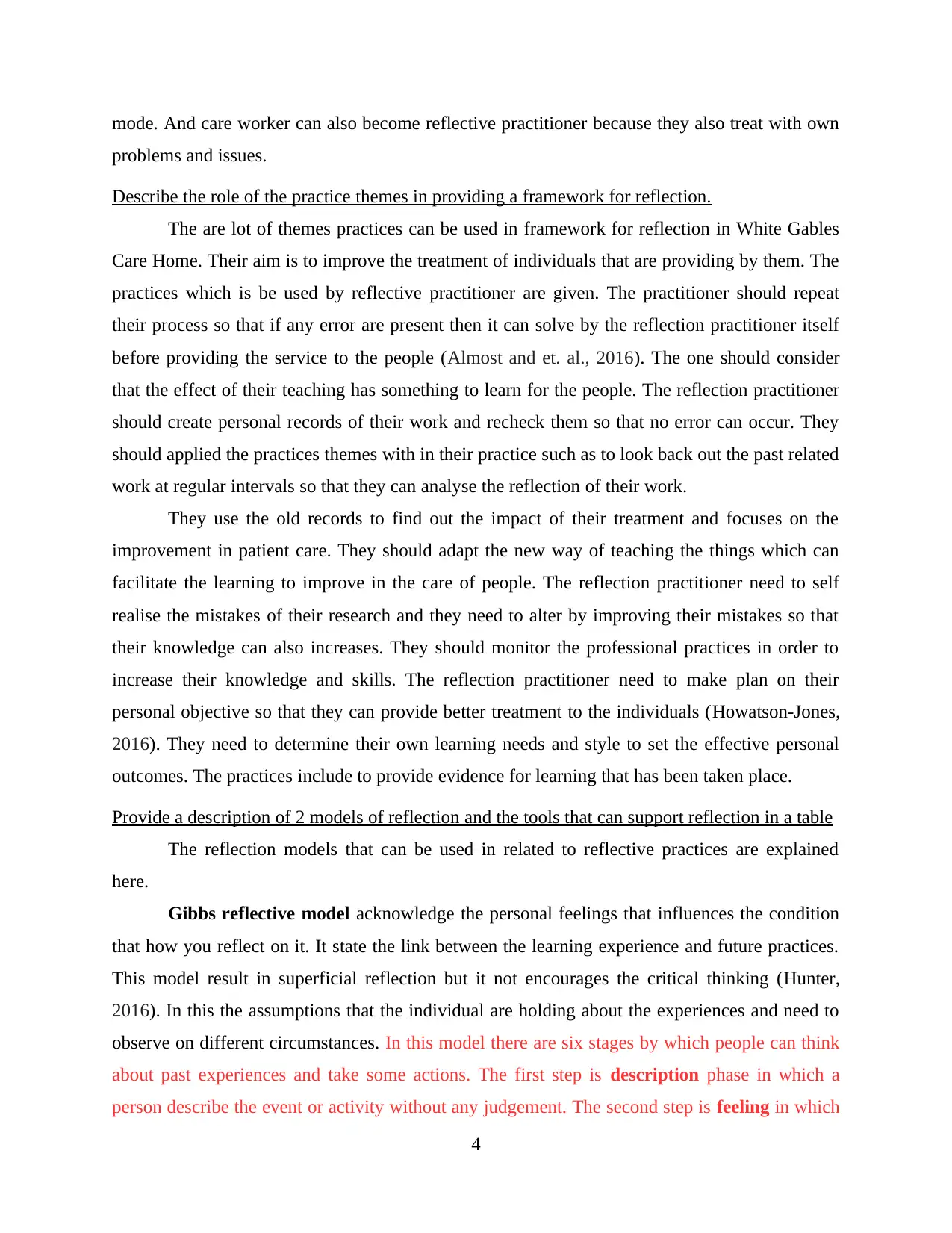
mode. And care worker can also become reflective practitioner because they also treat with own
problems and issues.
Describe the role of the practice themes in providing a framework for reflection.
The are lot of themes practices can be used in framework for reflection in White Gables
Care Home. Their aim is to improve the treatment of individuals that are providing by them. The
practices which is be used by reflective practitioner are given. The practitioner should repeat
their process so that if any error are present then it can solve by the reflection practitioner itself
before providing the service to the people (Almost and et. al., 2016). The one should consider
that the effect of their teaching has something to learn for the people. The reflection practitioner
should create personal records of their work and recheck them so that no error can occur. They
should applied the practices themes with in their practice such as to look back out the past related
work at regular intervals so that they can analyse the reflection of their work.
They use the old records to find out the impact of their treatment and focuses on the
improvement in patient care. They should adapt the new way of teaching the things which can
facilitate the learning to improve in the care of people. The reflection practitioner need to self
realise the mistakes of their research and they need to alter by improving their mistakes so that
their knowledge can also increases. They should monitor the professional practices in order to
increase their knowledge and skills. The reflection practitioner need to make plan on their
personal objective so that they can provide better treatment to the individuals (Howatson-Jones,
2016). They need to determine their own learning needs and style to set the effective personal
outcomes. The practices include to provide evidence for learning that has been taken place.
Provide a description of 2 models of reflection and the tools that can support reflection in a table
The reflection models that can be used in related to reflective practices are explained
here.
Gibbs reflective model acknowledge the personal feelings that influences the condition
that how you reflect on it. It state the link between the learning experience and future practices.
This model result in superficial reflection but it not encourages the critical thinking (Hunter,
2016). In this the assumptions that the individual are holding about the experiences and need to
observe on different circumstances. In this model there are six stages by which people can think
about past experiences and take some actions. The first step is description phase in which a
person describe the event or activity without any judgement. The second step is feeling in which
4
problems and issues.
Describe the role of the practice themes in providing a framework for reflection.
The are lot of themes practices can be used in framework for reflection in White Gables
Care Home. Their aim is to improve the treatment of individuals that are providing by them. The
practices which is be used by reflective practitioner are given. The practitioner should repeat
their process so that if any error are present then it can solve by the reflection practitioner itself
before providing the service to the people (Almost and et. al., 2016). The one should consider
that the effect of their teaching has something to learn for the people. The reflection practitioner
should create personal records of their work and recheck them so that no error can occur. They
should applied the practices themes with in their practice such as to look back out the past related
work at regular intervals so that they can analyse the reflection of their work.
They use the old records to find out the impact of their treatment and focuses on the
improvement in patient care. They should adapt the new way of teaching the things which can
facilitate the learning to improve in the care of people. The reflection practitioner need to self
realise the mistakes of their research and they need to alter by improving their mistakes so that
their knowledge can also increases. They should monitor the professional practices in order to
increase their knowledge and skills. The reflection practitioner need to make plan on their
personal objective so that they can provide better treatment to the individuals (Howatson-Jones,
2016). They need to determine their own learning needs and style to set the effective personal
outcomes. The practices include to provide evidence for learning that has been taken place.
Provide a description of 2 models of reflection and the tools that can support reflection in a table
The reflection models that can be used in related to reflective practices are explained
here.
Gibbs reflective model acknowledge the personal feelings that influences the condition
that how you reflect on it. It state the link between the learning experience and future practices.
This model result in superficial reflection but it not encourages the critical thinking (Hunter,
2016). In this the assumptions that the individual are holding about the experiences and need to
observe on different circumstances. In this model there are six stages by which people can think
about past experiences and take some actions. The first step is description phase in which a
person describe the event or activity without any judgement. The second step is feeling in which
4
Paraphrase This Document
Need a fresh take? Get an instant paraphrase of this document with our AI Paraphraser
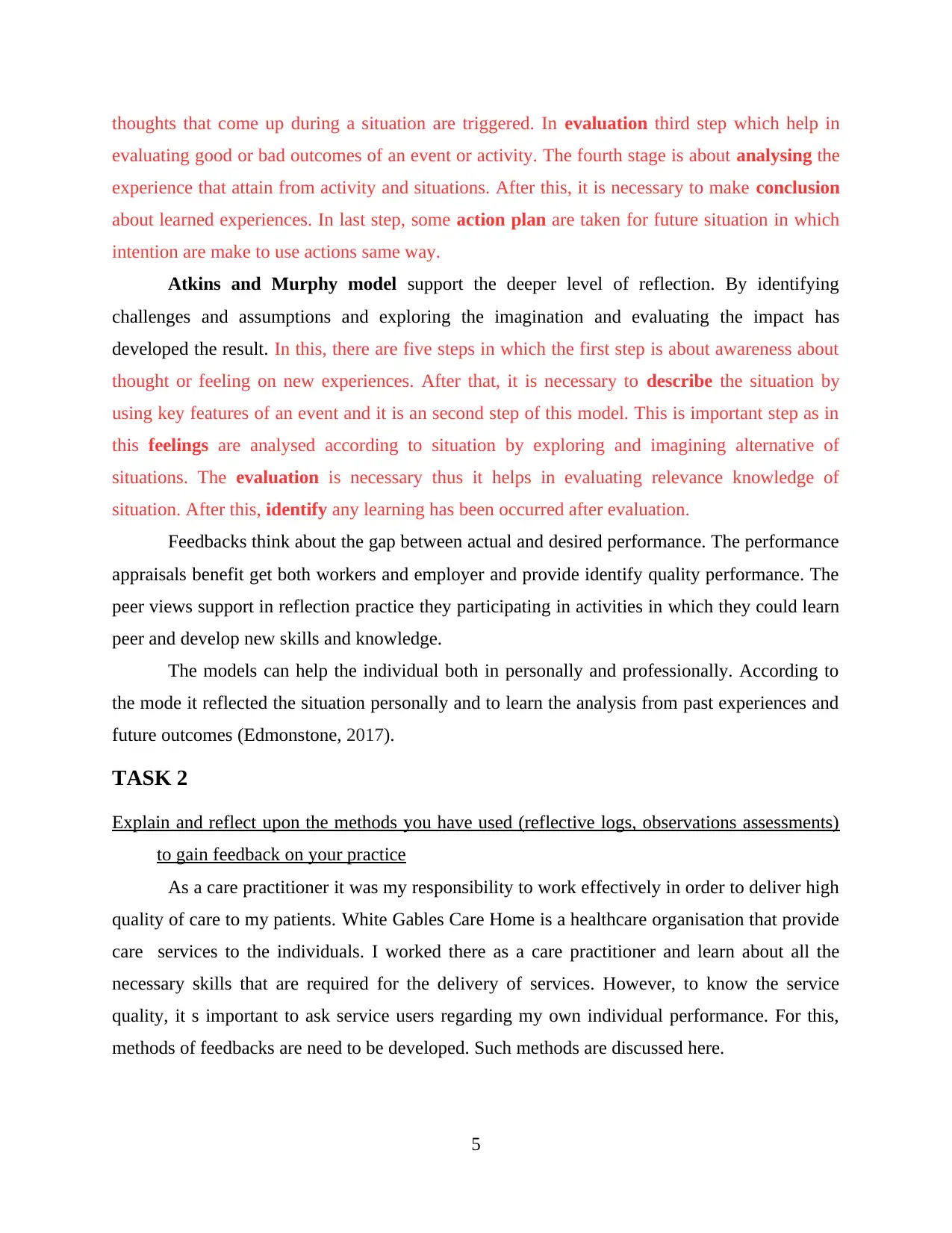
thoughts that come up during a situation are triggered. In evaluation third step which help in
evaluating good or bad outcomes of an event or activity. The fourth stage is about analysing the
experience that attain from activity and situations. After this, it is necessary to make conclusion
about learned experiences. In last step, some action plan are taken for future situation in which
intention are make to use actions same way.
Atkins and Murphy model support the deeper level of reflection. By identifying
challenges and assumptions and exploring the imagination and evaluating the impact has
developed the result. In this, there are five steps in which the first step is about awareness about
thought or feeling on new experiences. After that, it is necessary to describe the situation by
using key features of an event and it is an second step of this model. This is important step as in
this feelings are analysed according to situation by exploring and imagining alternative of
situations. The evaluation is necessary thus it helps in evaluating relevance knowledge of
situation. After this, identify any learning has been occurred after evaluation.
Feedbacks think about the gap between actual and desired performance. The performance
appraisals benefit get both workers and employer and provide identify quality performance. The
peer views support in reflection practice they participating in activities in which they could learn
peer and develop new skills and knowledge.
The models can help the individual both in personally and professionally. According to
the mode it reflected the situation personally and to learn the analysis from past experiences and
future outcomes (Edmonstone, 2017).
TASK 2
Explain and reflect upon the methods you have used (reflective logs, observations assessments)
to gain feedback on your practice
As a care practitioner it was my responsibility to work effectively in order to deliver high
quality of care to my patients. White Gables Care Home is a healthcare organisation that provide
care services to the individuals. I worked there as a care practitioner and learn about all the
necessary skills that are required for the delivery of services. However, to know the service
quality, it s important to ask service users regarding my own individual performance. For this,
methods of feedbacks are need to be developed. Such methods are discussed here.
5
evaluating good or bad outcomes of an event or activity. The fourth stage is about analysing the
experience that attain from activity and situations. After this, it is necessary to make conclusion
about learned experiences. In last step, some action plan are taken for future situation in which
intention are make to use actions same way.
Atkins and Murphy model support the deeper level of reflection. By identifying
challenges and assumptions and exploring the imagination and evaluating the impact has
developed the result. In this, there are five steps in which the first step is about awareness about
thought or feeling on new experiences. After that, it is necessary to describe the situation by
using key features of an event and it is an second step of this model. This is important step as in
this feelings are analysed according to situation by exploring and imagining alternative of
situations. The evaluation is necessary thus it helps in evaluating relevance knowledge of
situation. After this, identify any learning has been occurred after evaluation.
Feedbacks think about the gap between actual and desired performance. The performance
appraisals benefit get both workers and employer and provide identify quality performance. The
peer views support in reflection practice they participating in activities in which they could learn
peer and develop new skills and knowledge.
The models can help the individual both in personally and professionally. According to
the mode it reflected the situation personally and to learn the analysis from past experiences and
future outcomes (Edmonstone, 2017).
TASK 2
Explain and reflect upon the methods you have used (reflective logs, observations assessments)
to gain feedback on your practice
As a care practitioner it was my responsibility to work effectively in order to deliver high
quality of care to my patients. White Gables Care Home is a healthcare organisation that provide
care services to the individuals. I worked there as a care practitioner and learn about all the
necessary skills that are required for the delivery of services. However, to know the service
quality, it s important to ask service users regarding my own individual performance. For this,
methods of feedbacks are need to be developed. Such methods are discussed here.
5
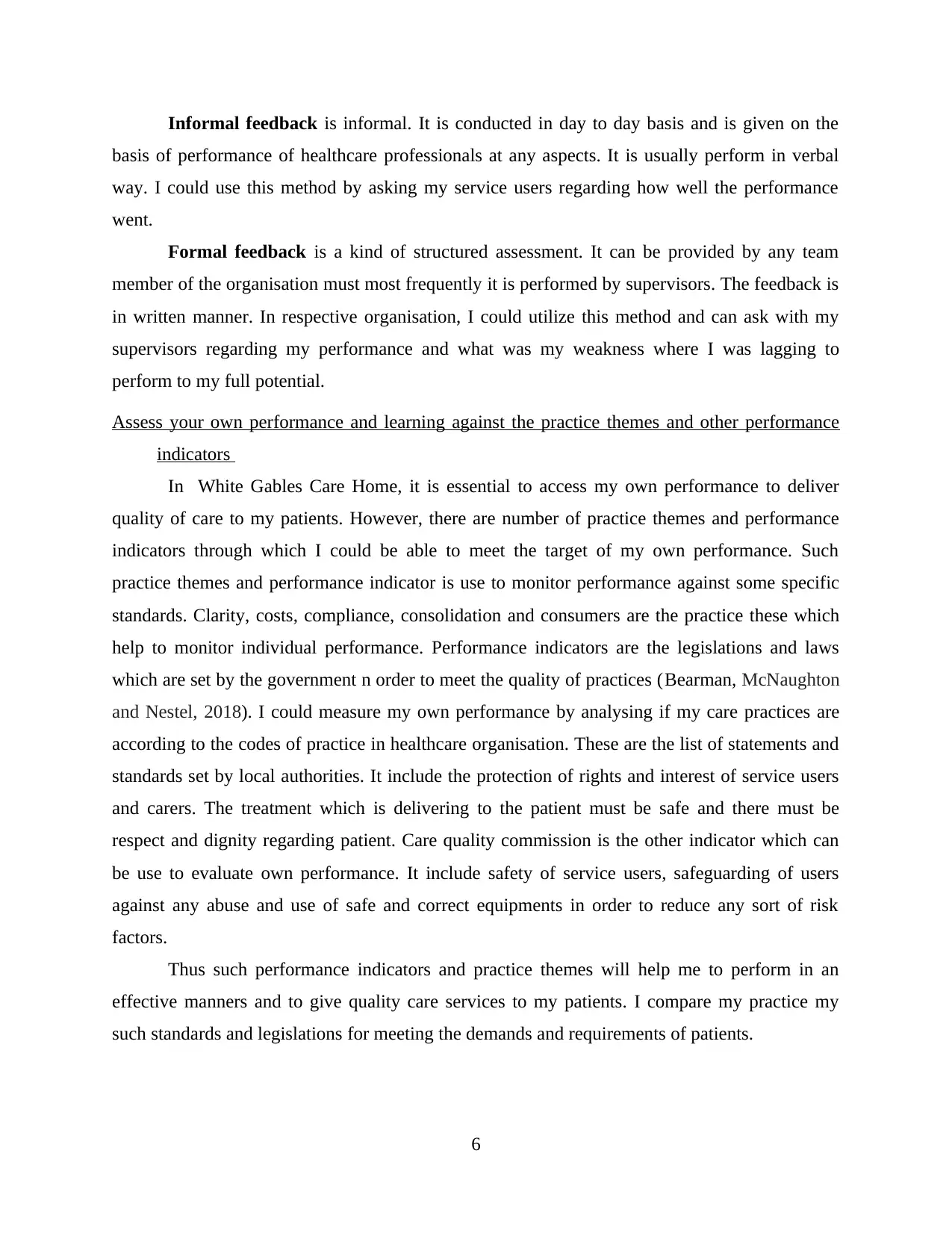
Informal feedback is informal. It is conducted in day to day basis and is given on the
basis of performance of healthcare professionals at any aspects. It is usually perform in verbal
way. I could use this method by asking my service users regarding how well the performance
went.
Formal feedback is a kind of structured assessment. It can be provided by any team
member of the organisation must most frequently it is performed by supervisors. The feedback is
in written manner. In respective organisation, I could utilize this method and can ask with my
supervisors regarding my performance and what was my weakness where I was lagging to
perform to my full potential.
Assess your own performance and learning against the practice themes and other performance
indicators
In White Gables Care Home, it is essential to access my own performance to deliver
quality of care to my patients. However, there are number of practice themes and performance
indicators through which I could be able to meet the target of my own performance. Such
practice themes and performance indicator is use to monitor performance against some specific
standards. Clarity, costs, compliance, consolidation and consumers are the practice these which
help to monitor individual performance. Performance indicators are the legislations and laws
which are set by the government n order to meet the quality of practices (Bearman, McNaughton
and Nestel, 2018). I could measure my own performance by analysing if my care practices are
according to the codes of practice in healthcare organisation. These are the list of statements and
standards set by local authorities. It include the protection of rights and interest of service users
and carers. The treatment which is delivering to the patient must be safe and there must be
respect and dignity regarding patient. Care quality commission is the other indicator which can
be use to evaluate own performance. It include safety of service users, safeguarding of users
against any abuse and use of safe and correct equipments in order to reduce any sort of risk
factors.
Thus such performance indicators and practice themes will help me to perform in an
effective manners and to give quality care services to my patients. I compare my practice my
such standards and legislations for meeting the demands and requirements of patients.
6
basis of performance of healthcare professionals at any aspects. It is usually perform in verbal
way. I could use this method by asking my service users regarding how well the performance
went.
Formal feedback is a kind of structured assessment. It can be provided by any team
member of the organisation must most frequently it is performed by supervisors. The feedback is
in written manner. In respective organisation, I could utilize this method and can ask with my
supervisors regarding my performance and what was my weakness where I was lagging to
perform to my full potential.
Assess your own performance and learning against the practice themes and other performance
indicators
In White Gables Care Home, it is essential to access my own performance to deliver
quality of care to my patients. However, there are number of practice themes and performance
indicators through which I could be able to meet the target of my own performance. Such
practice themes and performance indicator is use to monitor performance against some specific
standards. Clarity, costs, compliance, consolidation and consumers are the practice these which
help to monitor individual performance. Performance indicators are the legislations and laws
which are set by the government n order to meet the quality of practices (Bearman, McNaughton
and Nestel, 2018). I could measure my own performance by analysing if my care practices are
according to the codes of practice in healthcare organisation. These are the list of statements and
standards set by local authorities. It include the protection of rights and interest of service users
and carers. The treatment which is delivering to the patient must be safe and there must be
respect and dignity regarding patient. Care quality commission is the other indicator which can
be use to evaluate own performance. It include safety of service users, safeguarding of users
against any abuse and use of safe and correct equipments in order to reduce any sort of risk
factors.
Thus such performance indicators and practice themes will help me to perform in an
effective manners and to give quality care services to my patients. I compare my practice my
such standards and legislations for meeting the demands and requirements of patients.
6
⊘ This is a preview!⊘
Do you want full access?
Subscribe today to unlock all pages.

Trusted by 1+ million students worldwide
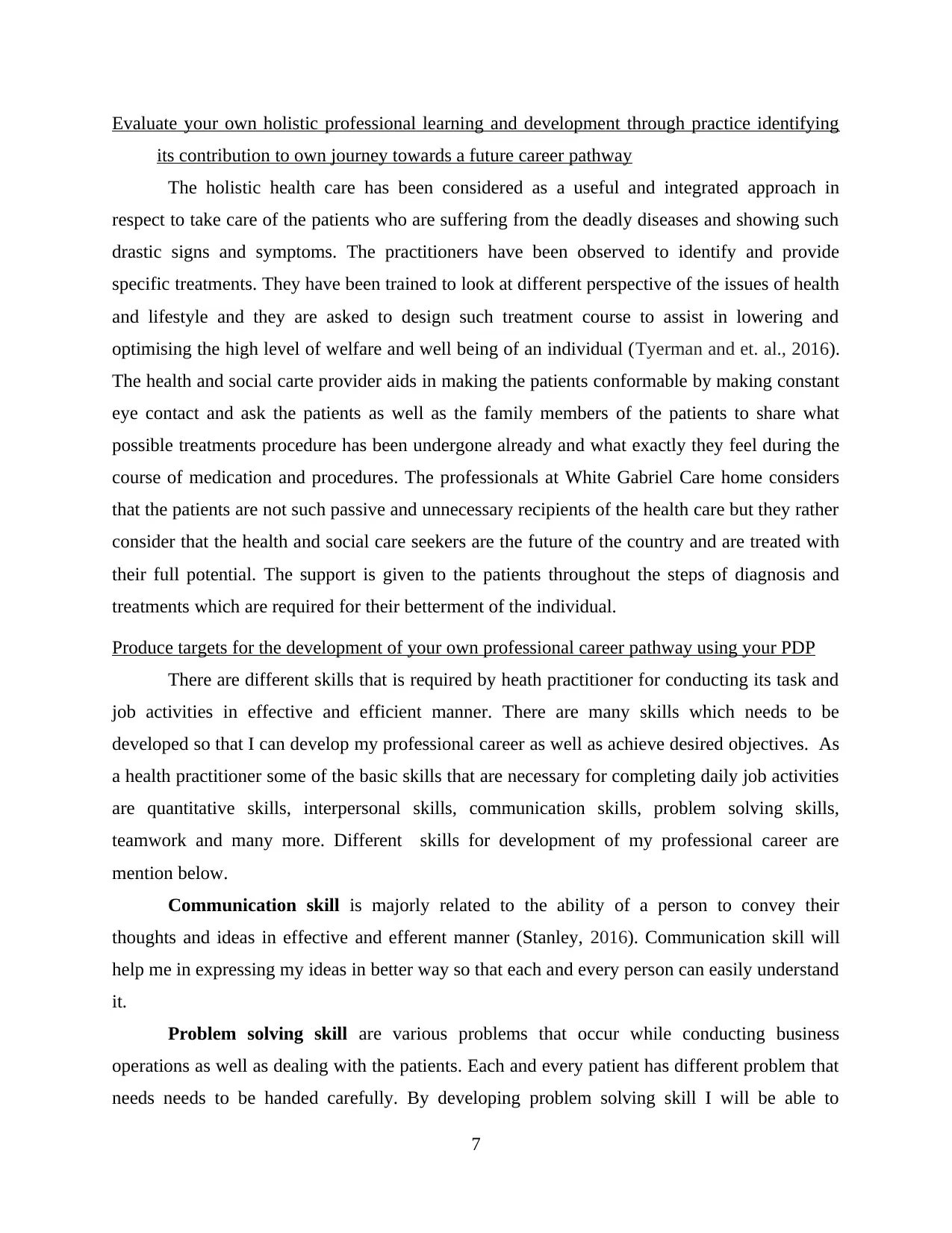
Evaluate your own holistic professional learning and development through practice identifying
its contribution to own journey towards a future career pathway
The holistic health care has been considered as a useful and integrated approach in
respect to take care of the patients who are suffering from the deadly diseases and showing such
drastic signs and symptoms. The practitioners have been observed to identify and provide
specific treatments. They have been trained to look at different perspective of the issues of health
and lifestyle and they are asked to design such treatment course to assist in lowering and
optimising the high level of welfare and well being of an individual (Tyerman and et. al., 2016).
The health and social carte provider aids in making the patients conformable by making constant
eye contact and ask the patients as well as the family members of the patients to share what
possible treatments procedure has been undergone already and what exactly they feel during the
course of medication and procedures. The professionals at White Gabriel Care home considers
that the patients are not such passive and unnecessary recipients of the health care but they rather
consider that the health and social care seekers are the future of the country and are treated with
their full potential. The support is given to the patients throughout the steps of diagnosis and
treatments which are required for their betterment of the individual.
Produce targets for the development of your own professional career pathway using your PDP
There are different skills that is required by heath practitioner for conducting its task and
job activities in effective and efficient manner. There are many skills which needs to be
developed so that I can develop my professional career as well as achieve desired objectives. As
a health practitioner some of the basic skills that are necessary for completing daily job activities
are quantitative skills, interpersonal skills, communication skills, problem solving skills,
teamwork and many more. Different skills for development of my professional career are
mention below.
Communication skill is majorly related to the ability of a person to convey their
thoughts and ideas in effective and efferent manner (Stanley, 2016). Communication skill will
help me in expressing my ideas in better way so that each and every person can easily understand
it.
Problem solving skill are various problems that occur while conducting business
operations as well as dealing with the patients. Each and every patient has different problem that
needs needs to be handed carefully. By developing problem solving skill I will be able to
7
its contribution to own journey towards a future career pathway
The holistic health care has been considered as a useful and integrated approach in
respect to take care of the patients who are suffering from the deadly diseases and showing such
drastic signs and symptoms. The practitioners have been observed to identify and provide
specific treatments. They have been trained to look at different perspective of the issues of health
and lifestyle and they are asked to design such treatment course to assist in lowering and
optimising the high level of welfare and well being of an individual (Tyerman and et. al., 2016).
The health and social carte provider aids in making the patients conformable by making constant
eye contact and ask the patients as well as the family members of the patients to share what
possible treatments procedure has been undergone already and what exactly they feel during the
course of medication and procedures. The professionals at White Gabriel Care home considers
that the patients are not such passive and unnecessary recipients of the health care but they rather
consider that the health and social care seekers are the future of the country and are treated with
their full potential. The support is given to the patients throughout the steps of diagnosis and
treatments which are required for their betterment of the individual.
Produce targets for the development of your own professional career pathway using your PDP
There are different skills that is required by heath practitioner for conducting its task and
job activities in effective and efficient manner. There are many skills which needs to be
developed so that I can develop my professional career as well as achieve desired objectives. As
a health practitioner some of the basic skills that are necessary for completing daily job activities
are quantitative skills, interpersonal skills, communication skills, problem solving skills,
teamwork and many more. Different skills for development of my professional career are
mention below.
Communication skill is majorly related to the ability of a person to convey their
thoughts and ideas in effective and efferent manner (Stanley, 2016). Communication skill will
help me in expressing my ideas in better way so that each and every person can easily understand
it.
Problem solving skill are various problems that occur while conducting business
operations as well as dealing with the patients. Each and every patient has different problem that
needs needs to be handed carefully. By developing problem solving skill I will be able to
7
Paraphrase This Document
Need a fresh take? Get an instant paraphrase of this document with our AI Paraphraser
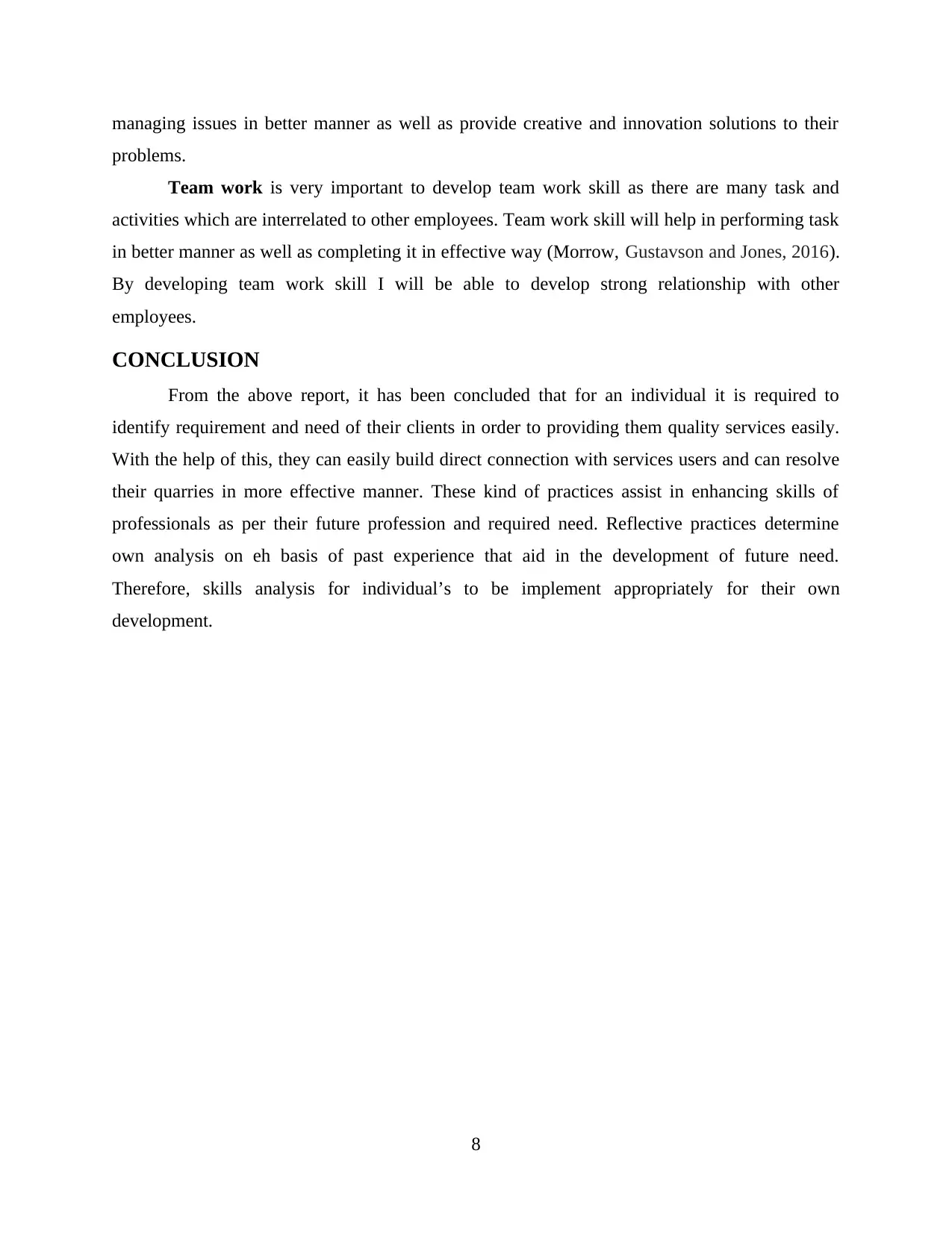
managing issues in better manner as well as provide creative and innovation solutions to their
problems.
Team work is very important to develop team work skill as there are many task and
activities which are interrelated to other employees. Team work skill will help in performing task
in better manner as well as completing it in effective way (Morrow, Gustavson and Jones, 2016).
By developing team work skill I will be able to develop strong relationship with other
employees.
CONCLUSION
From the above report, it has been concluded that for an individual it is required to
identify requirement and need of their clients in order to providing them quality services easily.
With the help of this, they can easily build direct connection with services users and can resolve
their quarries in more effective manner. These kind of practices assist in enhancing skills of
professionals as per their future profession and required need. Reflective practices determine
own analysis on eh basis of past experience that aid in the development of future need.
Therefore, skills analysis for individual’s to be implement appropriately for their own
development.
8
problems.
Team work is very important to develop team work skill as there are many task and
activities which are interrelated to other employees. Team work skill will help in performing task
in better manner as well as completing it in effective way (Morrow, Gustavson and Jones, 2016).
By developing team work skill I will be able to develop strong relationship with other
employees.
CONCLUSION
From the above report, it has been concluded that for an individual it is required to
identify requirement and need of their clients in order to providing them quality services easily.
With the help of this, they can easily build direct connection with services users and can resolve
their quarries in more effective manner. These kind of practices assist in enhancing skills of
professionals as per their future profession and required need. Reflective practices determine
own analysis on eh basis of past experience that aid in the development of future need.
Therefore, skills analysis for individual’s to be implement appropriately for their own
development.
8

9
⊘ This is a preview!⊘
Do you want full access?
Subscribe today to unlock all pages.

Trusted by 1+ million students worldwide
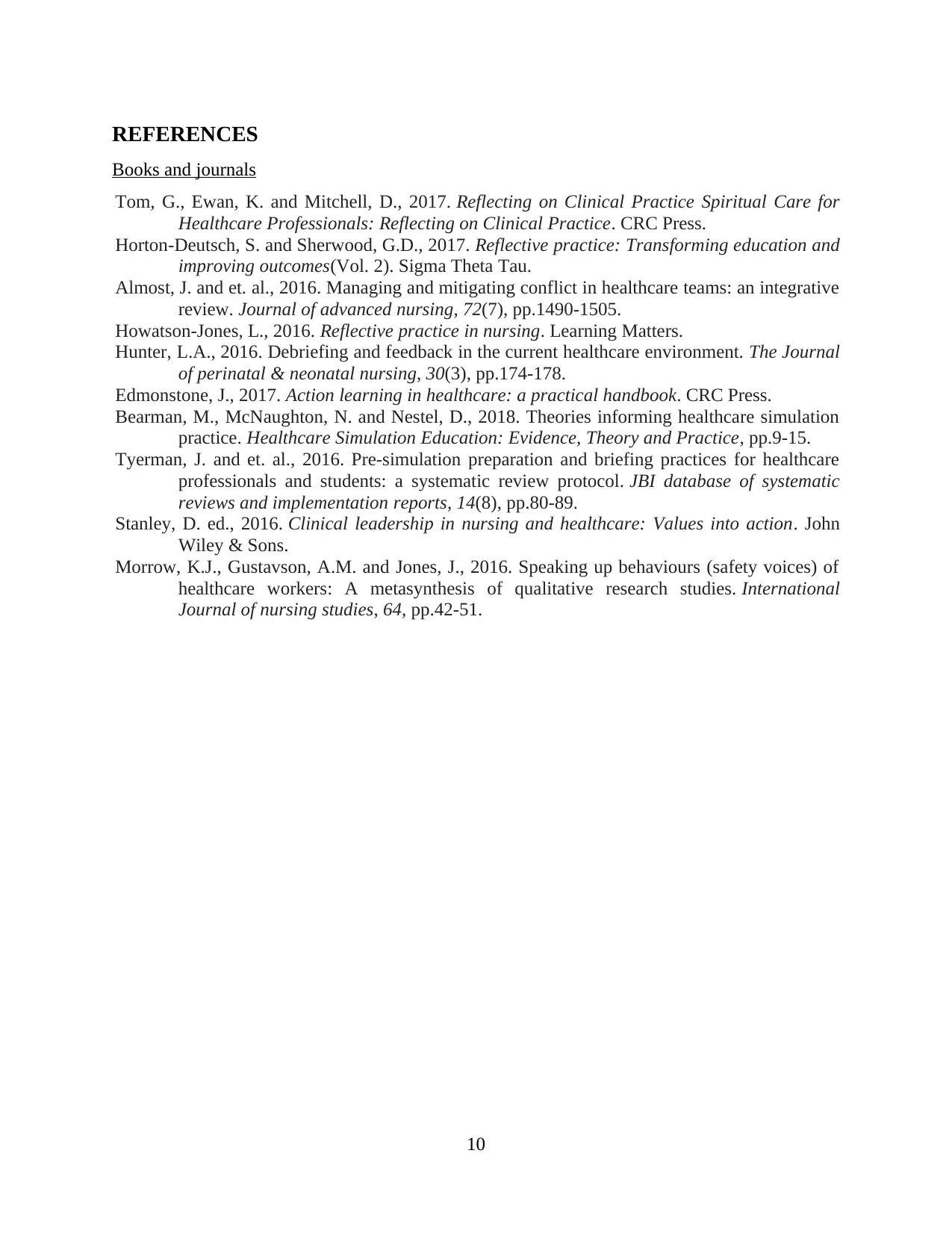
REFERENCES
Books and journals
Tom, G., Ewan, K. and Mitchell, D., 2017. Reflecting on Clinical Practice Spiritual Care for
Healthcare Professionals: Reflecting on Clinical Practice. CRC Press.
Horton-Deutsch, S. and Sherwood, G.D., 2017. Reflective practice: Transforming education and
improving outcomes(Vol. 2). Sigma Theta Tau.
Almost, J. and et. al., 2016. Managing and mitigating conflict in healthcare teams: an integrative
review. Journal of advanced nursing, 72(7), pp.1490-1505.
Howatson-Jones, L., 2016. Reflective practice in nursing. Learning Matters.
Hunter, L.A., 2016. Debriefing and feedback in the current healthcare environment. The Journal
of perinatal & neonatal nursing, 30(3), pp.174-178.
Edmonstone, J., 2017. Action learning in healthcare: a practical handbook. CRC Press.
Bearman, M., McNaughton, N. and Nestel, D., 2018. Theories informing healthcare simulation
practice. Healthcare Simulation Education: Evidence, Theory and Practice, pp.9-15.
Tyerman, J. and et. al., 2016. Pre-simulation preparation and briefing practices for healthcare
professionals and students: a systematic review protocol. JBI database of systematic
reviews and implementation reports, 14(8), pp.80-89.
Stanley, D. ed., 2016. Clinical leadership in nursing and healthcare: Values into action. John
Wiley & Sons.
Morrow, K.J., Gustavson, A.M. and Jones, J., 2016. Speaking up behaviours (safety voices) of
healthcare workers: A metasynthesis of qualitative research studies. International
Journal of nursing studies, 64, pp.42-51.
10
Books and journals
Tom, G., Ewan, K. and Mitchell, D., 2017. Reflecting on Clinical Practice Spiritual Care for
Healthcare Professionals: Reflecting on Clinical Practice. CRC Press.
Horton-Deutsch, S. and Sherwood, G.D., 2017. Reflective practice: Transforming education and
improving outcomes(Vol. 2). Sigma Theta Tau.
Almost, J. and et. al., 2016. Managing and mitigating conflict in healthcare teams: an integrative
review. Journal of advanced nursing, 72(7), pp.1490-1505.
Howatson-Jones, L., 2016. Reflective practice in nursing. Learning Matters.
Hunter, L.A., 2016. Debriefing and feedback in the current healthcare environment. The Journal
of perinatal & neonatal nursing, 30(3), pp.174-178.
Edmonstone, J., 2017. Action learning in healthcare: a practical handbook. CRC Press.
Bearman, M., McNaughton, N. and Nestel, D., 2018. Theories informing healthcare simulation
practice. Healthcare Simulation Education: Evidence, Theory and Practice, pp.9-15.
Tyerman, J. and et. al., 2016. Pre-simulation preparation and briefing practices for healthcare
professionals and students: a systematic review protocol. JBI database of systematic
reviews and implementation reports, 14(8), pp.80-89.
Stanley, D. ed., 2016. Clinical leadership in nursing and healthcare: Values into action. John
Wiley & Sons.
Morrow, K.J., Gustavson, A.M. and Jones, J., 2016. Speaking up behaviours (safety voices) of
healthcare workers: A metasynthesis of qualitative research studies. International
Journal of nursing studies, 64, pp.42-51.
10
1 out of 10
Related Documents
Your All-in-One AI-Powered Toolkit for Academic Success.
+13062052269
info@desklib.com
Available 24*7 on WhatsApp / Email
![[object Object]](/_next/static/media/star-bottom.7253800d.svg)
Unlock your academic potential
Copyright © 2020–2026 A2Z Services. All Rights Reserved. Developed and managed by ZUCOL.




